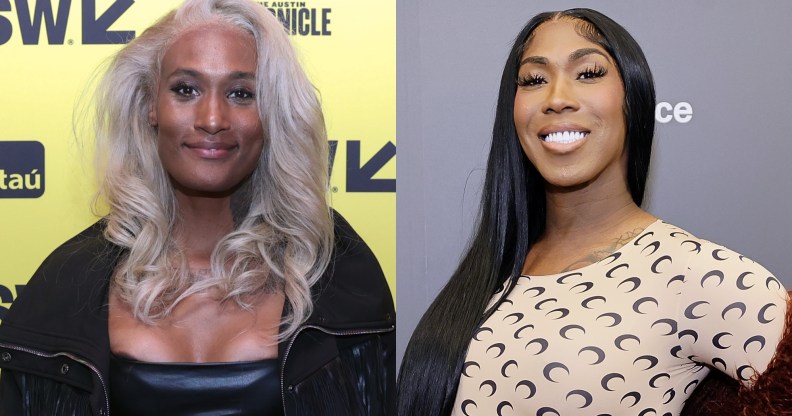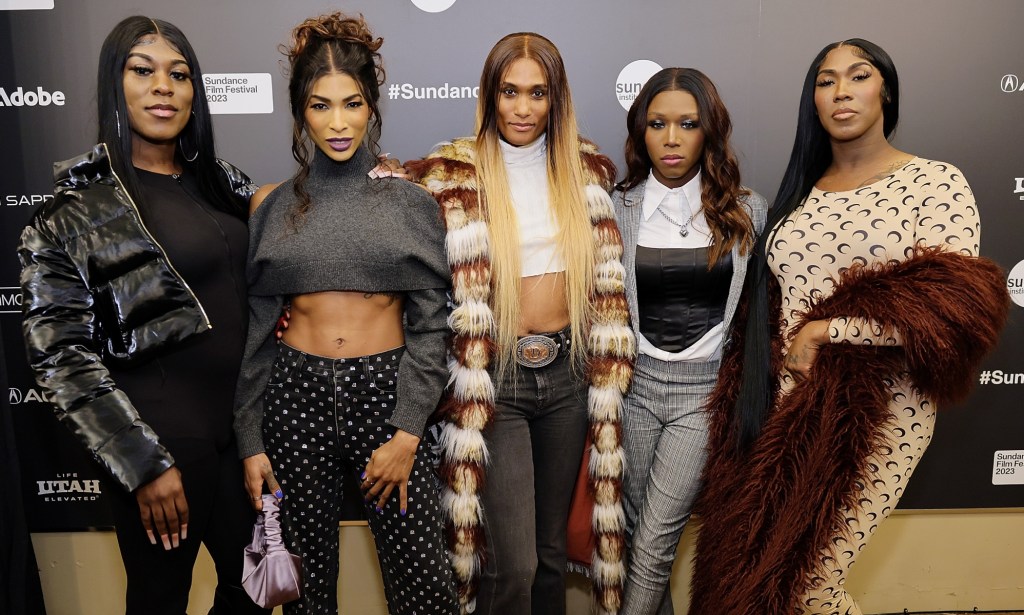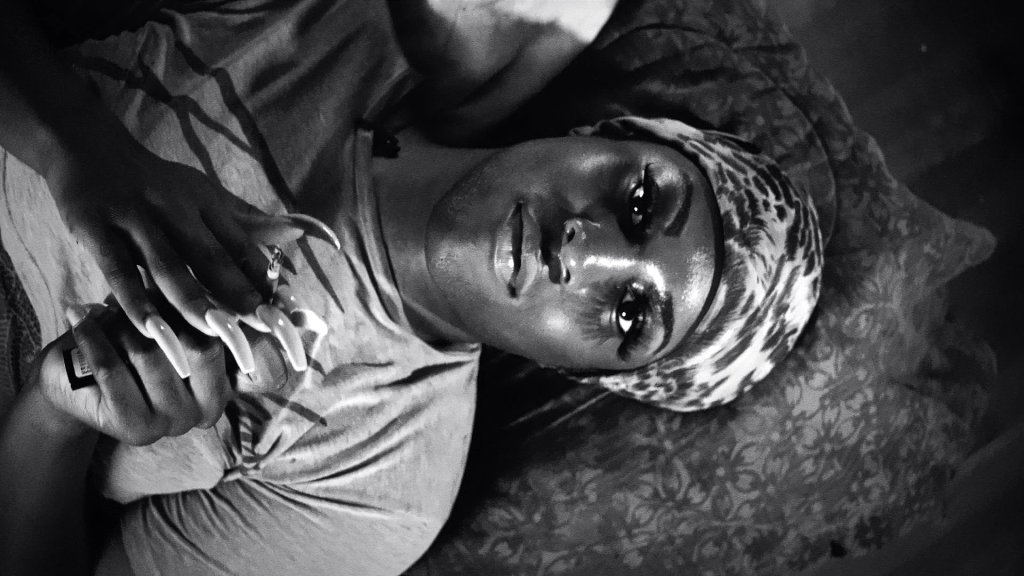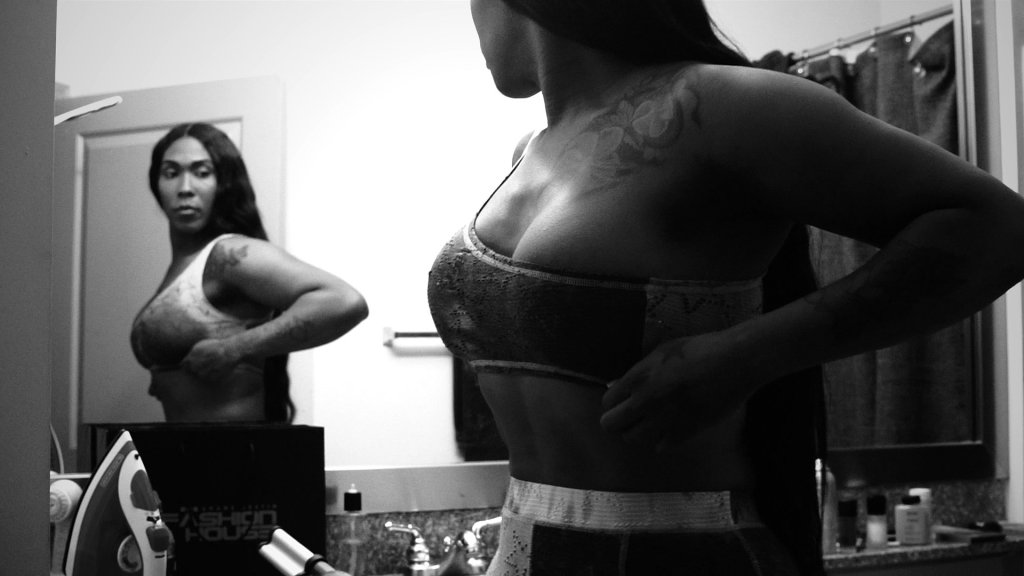Kokomo City creator D. Smith on the film’s late star Koko Da Doll: ‘She should never be forgotten’

D. Smith (L) talks Kokomo City and honouring Koko Da Doll’s (R) memory. (Getty)
D. Smith (L) talks Kokomo City and honouring Koko Da Doll's (R) memory. (Getty)
Award-winning filmmaker D. Smith tells PinkNews about second chances, critical acclaim and rewriting the narrative for Black trans sex workers in her directorial debut, Kokomo City.
Two time Grammy-award-winning music producer turned actor and director Smith is all too familiar with the rocky path ahead of Black trans women in the creative industry and the challenges facing the transgender community as a whole across the US as right-wing politicians roll out anti-LGBTQ+ legislation.
After being kicked out of home as a queer teenager, Smith was plucked from obscurity off the streets of New York City as a singer, songwriter and producer, working for the likes of Lil Wayne, Katy Perry, Fantasia and Billy Porter. But when she decided to fully embrace her identity as a trans woman in 2014 she was dropped by the music industry, leaving her with little money and few career options.
An answer came to her in the form of Kokomo City (a name inspired by 1930s blues singer James “Kokomo” Arnold), a 73-minute documentary that offers a “raw, edgy but rare” insight into the lives of four Black trans sex workers: Daniella Carter, Koko Da Doll, Liyah Mitchell and Dominique Silver.

“I didn’t know the title yet but I definitely knew the feel of it, how it would look,” Smith tells PinkNews of her initial idea for the film, which came to her in 2018. “[The final product] is truly what I wanted and it’s very rare as a creator that things really happen that way, but it has been so remarkably on point. I’m super blessed.
“I wanted to do something that was refreshing, captivating and something that caters to people outside the LGBTQ+ fortress. I really wanted to not just make a film for gay or trans people, I wanted to reach further, I wanted to tell a story about us as Black people.”
Kokomo City – whose executive producer is Emmy-Award-winning Master of None star Lena Waithe – deftly explores long-held stereotypes, offers heart-pounding stories, gives a platform to trans joy and starkly tackles a range of issues affecting Black trans sex workers, from race and sexuality to gender identity and capitalism.
It’s no surprise that the unflinchingly honest documentary received not only rave reviews but also the innovator and audience awards at this year’s Sundance Film Festival, before going on to success at the Berlin Film Festival.
“The magnitude of what is happening is hitting me,” Smith continues. “I wish I had the words to express this experience. Me being transgender is an inspiration to a lot of people. I just want to take this moment and maximise it, I’m showing up for everything that comes my way.
“I was pushed out of the music industry and it broke my heart so I am grateful for the second chance.”

Shot in black and white (Smith cites filmmakers Stephen Mizelas and Quentin Tarantino as major inspirations), Kokomo City sheds light on the daily dangers facing Black trans sex workers as Mitchell recalls the time she found a gun on one of her clients, who claimed it was for protection after previously being tricked by a trans sex worker.
“I wanted to have fresh voices in our narrative because it is not just trans women creating this narrative,” Smith continues. “There are the men who are in love with trans women, there are the cis Black women who don’t understand us. We all have the opportunity to learn from one another.
“I didn’t just want to make a film that was just going to uplift trans women and no one else. I wanted all sides of the story, to give a true reflection of what the girls have to do. It is so complicated and intriguing.”
But it is the four trans women at the heart of Kokomo City who truly make the film shine, regaling audiences with tales that range from hilarious to heart-wrenching.
“I wanted straightforward, smart, gritty and interesting trans women,” says Smith of the casting process, admitting she didn’t know any of the women prior to filming. “I wanted people who were really going to represent the culture.”
She spent her days scrolling through the comments under the social media pages of famous trans women until someone caught her eye. Then she would try to contact them.
“Their ability to trust me, that was the number-one test,” Smith confides. “I didn’t want anyone who was going to second-guess the possibilities of what we could create. I was upfront, just: ‘Hey, I don’t have a budget, I don’t have a team, there’s no glam or makeup. I just want you to be as honest and as transparent as possible, let me direct and do the rest’. And that’s exactly what happened.”

As filming got underway, Smith started unravelling her own preconceived biases around sex work. “Growing up, we are all taught that prostitution or sex work is very demeaning and it is not something that you want to glorify, it was categorised alongside thieves and murderers,” Smith says.
“It’s crazy how I saw these girls before and after we finished filming: night and day, and I want other people to have that experience as well. I wanted to create Kokomo City so that the girls had an opportunity to introduce themselves as people, as women, not just as sex workers.”
Giving a platform to trans sex workers over other members of the trans community was intentional. A 2015 survey from the National Centre for Transgender Equality found that nearly 75 per cent of trans sex workers had experienced sexual harassment, while one in 10 had been harassed, attacked or assaulted by the police.
As Smith puts it simply: “These are the girls who are targeted. When trans women are being murdered, it is the girls doing the sex work. It is not necessarily the girls on the red carpets or the glam squads or the PR teams or the agencies. It is the girls who are the most vulnerable, who are overlooked by the transgender community a lot of the time.”
Sadly, Smith has first-hand experience of this tragic reality. In April, just weeks after Kokomo City celebrated success at Sundance, Koko Da Doll became another victim of gun violence against trans women in the US after being shot dead in Atlanta, aged 35.
Tearing up, Smith says she is grateful she was able to immortalise her friend’s memory in film. “I don’t think I could top memorialising her energy,” she says. “There’s nothing, no money, no PR that could compare to that. She wanted this so bad and she got a good taste of it.

“Processing her passing was one of the hardest things I’ve ever had to deal with in my life. But I also understand how divinely it was orchestrated, because if she wasn’t in Kokomo City, who honestly would have known about her and given her dignity? She would have been another trans woman in Atlanta who was murdered.
“But the fact that God allowed me to meet her after I had started to film, it was for this purpose and she should never be forgotten.”
Koko Da Doll’s death also prompted Smith’s partner, B5 singer Dustin Michael, to confirm his relationship with the trans director, dismantling stigmas as he declared he didn’t “want to be one of those men benefitting from a trans woman in private and not celebrate her publically”.
Paying homage to Koko Da Doll’s larger-than-life legacy, Smith hopes the film not only fosters “compassion and empathy” but also shows young Black trans women that there is much more out there for them.
“Back in the day, you had to do sex work to live your life as a woman to afford the medical care,” Smith says. “Now, I want trans women to see other options rather than feeling they have to go straight to sex work. But the girls who are doing it by choice or don’t have options, I’m here to support them and I love them.”
The ethos of Kokomo City is encapsulated in its powerful final shot, which shows a nude Black trans woman’s body in all its glory – a euphoric moment of agency and reclamation.
“What Kokomo City boils down to is freedom, liberation and truth,” Smith concludes. “There are a lot of rules and boundaries and do’s and don’ts when it comes to transgender people.
“It’s very hard to be a human when you have all these fortresses built around you. I don’t want us to be stripped from being human. We’re gonna show people that it’s OK, that your anatomy as a trans woman is absolutely beautiful.”
Kokomo City is due to open in UK and Irish cinemas on 4 August.

